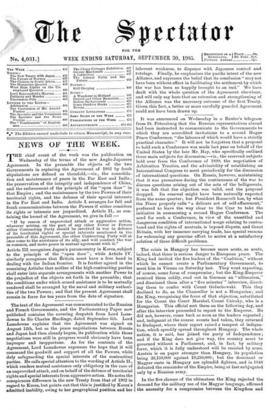The text of the Agreement was communicated to the Russian
and French Governments, and. the Parliamentary Paper now published contains the covering despatch from Lord Lans- downe to Sir Charles Hardinge, dated September 6th. Lord Lansdowne explains that the Agreement was signed on August 12th, but as the peace negotiations between Russia and Japan had then already begun, its publication while those negotiations were still in progress would obviously have been improper and inopportune. As for the contents of the Agreement, Lord Lansdowne expresses the hope that it will command the goodwill and support of all the Powers, while duly safeguarding the special interests of the contracting parties. He calls special attention to the wording of Article II., which renders mutual assistance only obligatory in the case of an unprovoked attack, and on behalf of the defence of -territorial rights and special interests from aggressive action. He notes the conspicuous difference in the new Treaty from that of 1902 in regard to Korea, but points out that this is justified by Korea's admitted inability, owing to her geographical position and her inherent weakness, to dispense with Japanese control and • tutelage. Finally, he emphasises the pacific intent of the new Alliaiice, and expresses the belief that its conclusion " may not have been without effect in facilitating the settlement by which the war has been so happily brought to an end." We have dealt with the whole question of the Agreement elsewhere, and will only say here that an extension and strengthening of the Alliance was the necessary outcome of the first Treaty. Given this fact, a better or more carefully guarded Agreement could not have been drawn up.










































